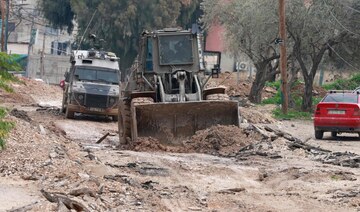UNITED NATIONS: UN Secretary-General António Guterres urged Sudan’s warring parties on Thursday to halt hostilities during the Muslim holy month of Ramadan, warning that the nearly year-long conflict threatens the country’s unity and “could ignite regional instability of dramatic proportions.”
Gen. Abdel Fattah Burhan, the head of Sudan’s military which has been fighting for control of Sudan with the rival commander of the country’s paramilitary force, welcomed the Ramadan ceasefire appeal, Sudan’s UN envoy said. But there was no immediate word from the commander of the paramilitary Rapid Support Forces, Mohammed Hamdan Dagalo.
UN Secretary-General António Guterres’ appeal came ahead of an expected UN Security Council vote Friday on a British-drafted resolution calling for “an immediate cessation of hostilities ahead of the month of Ramadan.”
The draft resolution expresses “grave concern over the spreading violence and the catastrophic and deteriorating humanitarian situation, including crisis levels of acute food insecurity, particularly in Darfur.”
Sudan plunged into chaos last April when long-simmering tensions between the military and paramilitary leaders broke out into street battles in the capital, Khartoum.
Fighting spread to other parts of the country, but in Sudan’s western Darfur region, it took on a different form, with brutal attacks by the Arab-dominated Rapid Support Forces on ethnic African civilians. Thousands of people have been killed.
Two decades ago, Sudan’s vast western Darfur region became synonymous with genocide and war crimes, particularly by the notorious Janjaweed Arab militias against populations that identify as Central or East African.
The International Criminal Court’s prosecutor, Karim Khan, said in late January there are grounds to believe both sides in the current conflict are committing possible war crimes, crimes against humanity or genocide in Darfur.
At a Security Council meeting on Sudan, Guterres pointed to renewed military offensives and growing fears of a further expansion of hostilities in the east, calls for arming civilians in various states, and armed groups entering the fighting in western Darfur and South Kordofan.
“All these dangerous developments are pouring fuel on the fire for an even more serious fragmentation of the country, a deepening of intra-and inter-communal tensions, and more ethnic violence,” Guterres said. “A Ramadan cessation of hostilities can help stem the suffering and usher the way to sustainable peace.”
Sudan’s UN Ambassador Al-Harith Mohamed said the government was “very pleased” with what the UN chief said and told the Security Council that he just heard from General Burhan. “He commends the secretary-general on his appeal for a cessation of hostilities during the month of Ramadan,” the ambassador said.
“However, he’s wondering about how to do this,” Mohamed said, stressing that the Rapid Support Forces are continuing their attacks. “All those who would like to see that appeal transformed into action … if they would like to present a mechanism for implementation of it, we would welcome it.”
UN spokesman Stephane Dujarric, asked whether there was a UN mechanism, replied: “First and foremost, it is within the capacity of both parties to stop fighting.”
“I think everyone is willing and ready to help,” Dujarric told reporters. “The most important thing is that those who have their fingers on the trigger silence their weapons.”
As the conflict continues with no end in sight, Guterres warned that the humanitarian consequences of the conflict are reaching “colossal proportions.”
Half of Sudan’s population — 25 million people — need life-saving assistance, some 18 million are “acutely food insecure,” and the UN is receiving reports of children dying from malnutrition, Guterres said.
Sudan also has the world’s worst internal displacement crisis, with 6.3 million people who fled their homes and remain in the country seeking safety, he said. Civilian infrastructure has been destroyed and 70 percent of health facilities in conflict areas aren’t functioning. And millions of children aren’t going to school.
He said the UN is also receiving reports of systematic sexual violence, including rape and gang rape, as well as abduction and trafficking “for the purpose of sexual exploitation.”
With Ramadan expected to begin around Sunday, depending on the sighting of the new moon, Britain’s deputy UN ambassador James Kariuki said he hopes for a Security Council vote on a Ramadan ceasefire on Friday.
“The Sudanese Armed Forces and Rapid Support Forces bear responsibility for the horrendous situation in Sudan,” he told the council. “Shelling and attacks from both sides in heavily populated urban areas and across the entire western region of Sudan continue to kill and terrorize civilians.”
Kariuki echoed the secretary-general’s call for an immediate ceasefire for Ramadan and urged the government to allow humanitarian aid deliveries from neighboring Chad to conflict-torn Darfur, and both sides to allow deliveries across conflict lines.
“It should not be for the military leadership of both the SAF (Sudan Armed Forces) or RSF to determine the political future of Sudan,” Kariuki said. “We call on them to give way to a civilian transitional government that will fully respect the basic human rights of the Sudanese people.”


























